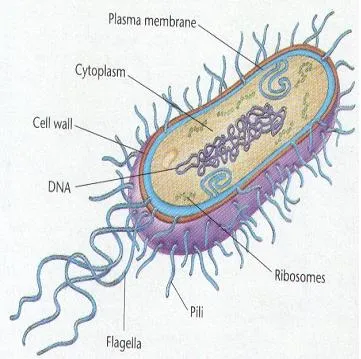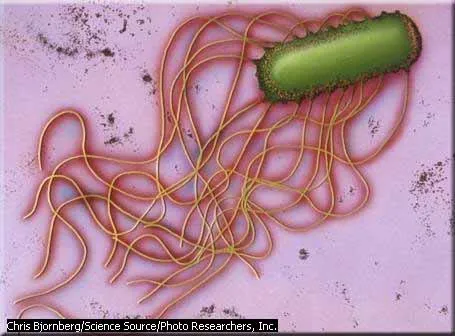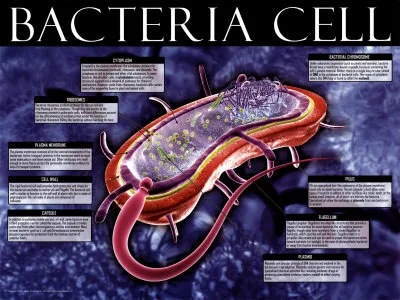Bacteria

Bacteria (bacterium, singular)
Bacteria are microorganisms that lack a nucleus and have a cell wall composed
of a protein-sugar molecule.
The most common organism on our planet, bacteria live symbiotically
with all other living organisms known to man. Bacteria measure to be
less than 1 micron in size, but reproduce to concentrations that often
allow them to be visible to the naked eye. Categorized as prokaryotes
(single-celled organisms that lack a nuclear membrane), they have been
placed in their own kingdom, Monera, because of the uniqueness of their
design.
Bacteria are one-celled organisms visible only with a microscope. They're
so small that if you lined up a thousand of them end to end, they could
fit across the end of a pencil eraser. They're shaped like short rods,
spheres or spirals. They're usually self-sufficient and multiply by subdivision.
Among the earliest forms of life on earth, bacteria have evolved to
thrive in a variety of environments. Some can withstand searing heat
or frigid cold, and others can survive radiation levels that would be
lethal to a human being. Many bacteria, however, prefer the mild environment
of a healthy body.

Like all living organisms on our planet, bacteria require
carbon to survive. Bacteria are classified into categories based on the
method in which they acquire the carbon necessary for their survival.
This plays a significant role in the ways they affect our body. Some
bacteria use fermentation to produce the necessary nutrients needed to
survive, which leads to the release of by-products such as alcohol, lactic
acid, formic acid, carbon dioxide, acetic acid, and sometimes water.
Many of these by-products are what cause the illnesses contributed to
a bacterial infection.
Many bacteria have protrusions from their exterior walls called pili
and flagella. These are hair-like extensions that allow the bacteria
to stick to objects or repel away from them, often to move toward nutrients
or away from harmful toxins. Additionally, many bacteria will develop
thick exterior walls called endospores, allowing them to endure harsh
environmental conditions, attacks from viruses or antibiotics, and long
periods when nutrients are scarce.

When infectious bacteria enter your body, they can cause illness.
They rapidly reproduce, and many produce toxins -- powerful chemicals
that damage specific cells in the tissue they've invaded. That's what
makes you ill. The organism that causes gonorrhea (gonococcus) is an
example of a bacterial invader. Others include some strains of the bacterium
Escherichia coli -- better known as E. coli -- which cause severe gastrointestinal
illness and are most often contracted via contaminated food. Other conditions
caused by bacteria include strep throat and staph infection.
The influenza virus takes over healthy cells, spreads through your body
and causes illness. Signs and symptoms include fever, chills, muscle
aches and malaise.
Bubonic, pneumonic, and septicemic plague, cholera, tuberculosis, and
many other illnesses and disease are caused by the small group of known
bacteria that negatively affect our bodies. It is well known and documented
that these diseases and the bacteria that cause them have mutated dramatically
in recent years. The overuse of antibiotics in the past and present
has caused these bacteria to mutate and become immune to modern medical
remedies.

